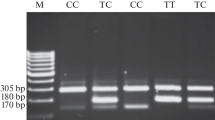Abstract
The aim of the present study was to determine the association of the Forkhead box P3 (FoxP3) rs3761548 polymorphism with the risk of colorectal cancer (CRC). Polymorphism genotyping was detected with polymerase chain reaction-polyacrylamide gel electrophoresis (PCR-PAGE), and data revealed that the AA, AC, and the combined A variant genotype (AA+AC) conferred a significantly greater risk of CRC [OR (95 % CI) = 2.806 (1.726–4.563), 1.54 (1.121–2.11), and 1.797 (1.344–2.404), respectively]. Moreover, the A allele of rs3761548 was observed to be associated with higher susceptibility of CRC [OR (95 % CI) = 1.792 (1.424–2.254)]. Unfortunately, no significant association was observed between the two subgroups after stratification by clinical characteristics including age; gender; tumor size, growth pattern, or differentiation; lymph node metastasis; and TNM pathological stage. Thus, we concluded that the FoxP3 gene polymorphism contributes to CRC susceptibility in a Chinese population.
Similar content being viewed by others
References
Mitry E, Rachet B, Quinn MJ, Cooper N, Coleman MP. Survival from cancer of the rectum in England and Wales up to 2001. Br J Cancer. 2008;99(1):S30–2.
Galon J, Fridman WH, Pages F. The adaptive immunologic microenvironment in colorectal cancer: a novel perspective. Cancer Res. 2007;67:1883–6.
Sakaguchi S. Naturally arising Foxp3-expressing CD25+ CD4+ regulatory T cells in immunological tolerance to self and non-self. Nat Immunol. 2005;6:345–52.
Wang HY, Wang RF. Regulatory T cells and cancer. Curr Opin Immunol. 2007;19:217–23.
Kim M, Grimmig T, Grimm M, Lazariotou M, Meier E, Rosenwald A, et al. Expression of foxp3 in colorectal cancer but not in treg cells correlates with disease progression in patients with colorectal cancer. PLoS ONE. 2013;8:e53630.
Salama P, Phillips M, Grieu F, Morris M, Zeps N, Joseph D, et al. Tumor-infiltrating FOXP3+ T regulatory cells show strong prognostic significance in colorectal cancer. J Clin Oncol. 2009;27:186–92.
Clarke SL, Betts GJ, Plant A, Wright KL, El-Shanawany TM, Harrop R, et al. CD4+ CD25+ FOXP3+ regulatory T cells suppress anti-tumor immune responses in patients with colorectal cancer. PLoS ONE. 2006;1:e129.
Somasundaram R, Jacob L, Swoboda R, Caputo L, Song H, Basak S, et al. Inhibition of cytolytic T lymphocyte proliferation by autologous CD4+/CD25+ regulatory T cells in a colorectal carcinoma patient is mediated by transforming growth factor-β. Cancer Res. 2002;62:5267–72.
Bonertz A, Weitz J, Pietsch DH, Rahbari NN, Schlude C, Ge Y, et al. Antigen-specific Tregs control T cell responses against a limited repertoire of tumor antigens in patients with colorectal carcinoma. J Clin Investig. 2009;119:3311–21.
Tang Q, Bluestone JA. The Foxp3+ regulatory T cell: a jack of all trades, master of regulation. Nat Immunol. 2008;9:239–44.
Fontenot JD, Rasmussen JP, Williams LM, Dooley JL, Farr AG, Rudensky AY. Regulatory T cell lineage specification by the forkhead transcription factor foxp3. Immunity. 2005;22:329–41.
Zhang L, Zhang Y, Desrosiers M, Wang C, Zhao Y, Han D. Genetic association study of FOXP3 polymorphisms in allergic rhinitis in a Chinese population. Hum Immunol. 2009;70(11):930–4.
Bossowski A, Borysewicz-Sańczyk H, Wawrusiewicz-Kurylonek N, Zasim A, Szalecki M, Wikiera B, et al. Analysis of chosen polymorphisms in FoxP3 gene in children and adolescents with autoimmune thyroid diseases. Autoimmunity. 2014;47(6):395–400.
Gao L, Li K, Li F, Li H, Liu L, Wang L, et al. Polymorphisms in the FOXP3 gene in Han Chinese psoriasis patients. J Dermatol Sci. 2010;57(1):51–6.
Jahan P, Ramachander VR, Maruthi G, Nalini S, Latha KP, Murthy TS. Foxp3 promoter polymorphism (rs3761548) in breast cancer progression: a study from India. Tumour Biol. 2014;35(4):3785–91.
Lopes LF, Guembarovski RL, Guembarovski AL, Kishima MO, Campos CZ, Oda JM, et al. FOXP3 transcription Factor: a candidate marker for susceptibility and prognosis in triple negative breast cancer. Biomed Res Int. 2014;2014:341654.
Chen Y, Zhang H, Liao W, Zhou J, He G, Xie X, et al. FOXP3 gene polymorphism is associated with hepatitis B-related hepatocellular carcinoma in China. J Exp Clin Cancer Res. 2013;32:39.
Littman DR, Rudensky A. Th17 and regulatory T Cells in mediating and restraining inflammation. Cell. 2010;140:845–58.
Beyer M, Schultze JL. Regulatory T cells in cancer. Blood. 2006;108:804–11.
Liu Z, Huang Q, Liu G, Dang L, Chu D, Tao K, et al. Presence of FOXP3(+)Treg cells is correlated with colorectal cancer progression. Int J Clin Exp Med. 2014;7(7):1781–5.
Ling A, Edin S, Wikberg ML, Öberg Å, Palmqvist R. The intratumoural subsite and relation of CD8(+) and FOXP3(+) T lymphocytes in colorectal cancer provide important prognostic clues. Br J Cancer. 2014;110(10):2551–9.
Aiello M, Vella N, Cannavo C, Scalisi A, Spandidos DA, Toffoli G, et al. Role of genetic polymorphisms and mutations in colorectal cancer therapy. Mol Med Rep. 2011;4(2):203–8.
Winder T, Lenz HJ. Molecular predictive and prognostic markers in colon cancer. Cancer Treat Rev. 2010;36(7):550–6.
Conflict of interest
All authors have no conflict of interest.
Author information
Authors and Affiliations
Corresponding author
Rights and permissions
About this article
Cite this article
Chen, L., Yu, Q., Liu, B. et al. Association of FoxP3 rs3761548 polymorphism with susceptibility to colorectal cancer in the Chinese population. Med Oncol 31, 374 (2014). https://doi.org/10.1007/s12032-014-0374-0
Received:
Accepted:
Published:
DOI: https://doi.org/10.1007/s12032-014-0374-0




